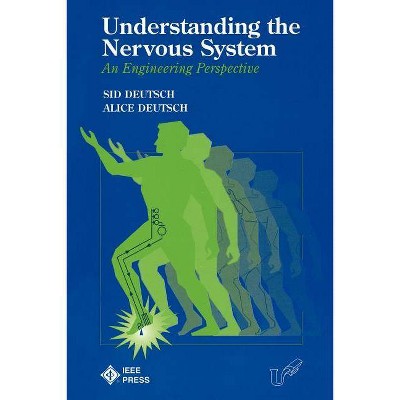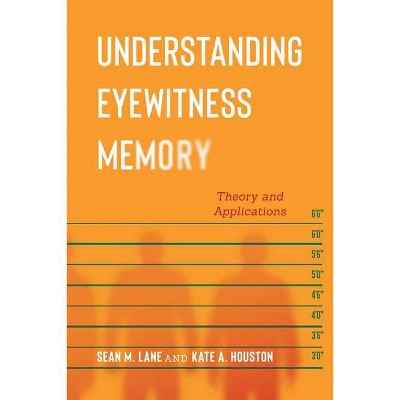Understanding Psychology as a Science - by Zoltan Dienes (Paperback)

Similar Products
Products of same category from the store
AllProduct info
<p/><br></br><p><b> Book Synopsis </b></p></br></br><p>How can we objectively define categories of truth in scientific thinking? How can we reliably measure the results of research? In this ground-breaking text, Dienes undertakes a comprehensive historical analysis of the dominant schools of thought, key theories and influential thinkers that have progressed the foundational principles and characteristics that typify scientific research methodology today. This book delivers a masterfully simple, 'though not simplistic', introduction to the core arguments surrounding Popper, Kuhn and Lakatos, Fisher and Royall, Neyman and Pearson and Bayes. Subsequently, this book clarifies the prevalent misconceptions that surround such theoretical perspectives in psychology today, providing an especially accessible critique for student readers. <p/>This book launches an informative inquiry into the methods by which psychologists throughout history have arrived at the conclusions of research, equipping readers with the knowledge to accurately design and evaluate their own research and gain confidence in critiquing results in psychology research. Particular attention is given to understanding methods of measuring the falsifiability of statements, probabilities and the differing views on statistical inference. An illuminating book for any undergraduate psychology student taking courses in critical thinking, research methods, BPS's core area 'conceptual and historical issues' as well as those studying masters, phd's and experienced researchers.</p><p/><br></br><p><b> From the Back Cover </b></p></br></br><p>What makes psychology a science? <p/>What is the logic underlying psychological research? <p/>In this groundbreaking book Zoltán Dienes introduces students to key issues in the philosophy of science and statistics that have a direct and vital bearing on the practice of research in psychology. The book is organised around the influential thinkers and conceptual debates which pervade psychological research and teaching but until now have not been made accessible to students. In a clear and fluid style, Dienes takes the reader on a compelling tour of the ideas of: <p/>- Popper<br>- Kuhn& Lakatos<br>- Neyman& Pearson<br>- Bayes<br>- Fisher& Royall <p/>Featuring examples drawn from extensive teaching experience to ground the ideas firmly in <em>psychological science, </em>the book is an ideal companion to courses and modules in psychological research methods and also to those covering conceptual and historical issues. <p/> </p><p/><br></br><p><b> Review Quotes </b></p></br></br><br>"An engrossing read. Dienes relates statistical controversies to generalissues in the philosophy of science, and in so doing puts commonmisconceptions right. The book is full of advice that makes thedifference between a mediocre and expert researcher. Despite some difficult passages I was drawn into the story and imagine that when reading about statistics - remarkable! In sum: A very useful correction to our typical methods courses for advanced undergrads, graduates, andeven many established researchers." - Professor Josef Perner, University of Salzburg<p>"Quite remarkable. A text book on research methods that actually explains how science works, why it has the exciting texture that it does and what the philosophical principles are that underlie it. It will change the way in which research methods courses are taught in the social sciences which, I think, is a very good thing...This volume has the potential to stimulate a dramatic and welcome shift in how social scientists are trained." - Arthur Reber, Broeklundian Professor, Emeritus, CUNY."</p><p>"I can thoroughly recommend this book. Dienes makes topics that are often dull interesting, coverspositions he does not favour fairly and comprehensively, and describes all the important issues succinctly without covering the many things that, whilst interesting to people working in the field, are probably irrelevant to a basic grounding. In short, a really nice, brief, but comprehensive account of the important issues underlying psychology understanding." - Dr RolandBaddeley, University of Bristol, UK</p><p>"This book presents psychology students with a careful line of argument, and is in itself an excellent example of how to write. It provides an authoritative and lucid treatment of the scientific nature of psychology that will appeal to undergraduates and anyone else interested in the tussle between science and irrationality." - Morag Maclean, Oxford Brookes University, UK. </p>"<br><br>"An engrossing read. Dienes relates statistical controversies to general issues in the philosophy of science, and in so doing puts common misconceptions right. The book is full of advice that makes the difference between a mediocre and expert researcher. Despite some difficult passages I was drawn into the story and imagine that when reading about statistics - remarkable! In sum: A very useful correction to our typical methods courses for advanced undergrads, graduates, and even many established researchers." - Professor Josef Perner, University of Salzburg<P>"Quite remarkable. A text book on research methods that actually explains how science works, why it has the exciting texture that it does and what the philosophical principles are that underlie it. It will change the way in which research methods courses are taught in the social sciences which, I think, is a very good thing...This volume has the potential to stimulate a dramatic and welcome sh<br><br>"Quite remarkable. A text book on research methods that actually explains how science works, why it has the exciting texture that it does and what the philosophical principles are that underlie it. It will change the way in which research methods courses are taught in the social sciences which, I think, is a very good thing...This volume has the potential to stimulate a dramatic and welcome shift in how social scientists are trained." - Arthur Reber, Broeklundian Professor, Emeritus, CUNY." <P><BR>"I can thoroughly recommend this book. Dienes makes topics that are often dull interesting, covers positions he does not favour fairly and comprehensively, and describes all the important issues succinctly without covering the many things that, whilst interesting to people working in the field, are probably irrelevant to a basic grounding. In short, a really nice, brief, but comprehensive account of the important issues underlying psychology understanding." - Dr Roland Baddeley, University of Bristol, UK <P><BR>"This book presents psychology students with a careful line of argument, and is in itself an excellent example of how to write. It provides an authoritative and lucid treatment of the scientific nature of psychology that will appeal to undergraduates and anyone else interested in the tussle between science and irrationality." - Morag Maclean, Oxford Brookes University, UK. <BR><br><br>'This book provides a superb introduction to the field of behavioral economics, suitable not only as an introductory text, but also as an entry-point for those desiring an engaging overview of the field. By providing his own unique and interesting perspective on the material he reviews, Wilkinson succeeds at the difficult task of holding the reader's interest while providing remarkably comprehensive coverage. This book will help readers to share in the excitement of those currently working in the field.' - Professor George Loewenstein, Carnegie Mellon University, USA <BR>'This is a wonderful book that manages to be very timely and up-to-date, balanced, readable, and teachable. This is a major achievement in describing a fast-moving and controversial approach to expanding the scope of economics into its proper psychological foundation.' - Professor Colin F. Camerer, California Institute of Technology, USA <BR>'Nick Wilkinson has done a commendable job covering a large body of theoretical, experimental and empirical research. Any student would benefit from this up-to-date introduction to this blooming field. Even specialists in the area would gain much from this textbook, which offers an impressively complete synthesis of thirty years' worth of research at the intersection of psychology and economics.' - Professor Simon Gaechter, University of Nottingham, UK <BR>'An increasing number of economists believe that the future direction of economics is inextricably linked with insights derived from psychology and sociology. This book provides a clear and comprehensive introduction to this endeavour that serves to illuminate, educate and open one's mind to the possibilities. It successfullyconveys both the insights and the sense of excitement generated from this growing body of research, and deserves a prominent place on the shelves of all economists and other social scientists.' - Dr Sanjit Dhami, University of Leicester, UK<br><p/><br></br><p><b> About the Author </b></p></br></br><p>ZOLTAN DIENES is a Reader in Experimental Psychology at the University of Sussex, where he has lectured since 1990. His main research area is learning and he has written 65 publications. He teaches a core course on philosophy of psychology to all final year psychology undergraduates.<br>ZOLTAN DIENES is a Reader in Experimental Psychology at the University of Sussex, where he has lectured since 1990. His main research area is learning and he has written 65 publications. He teaches a core course on philosophy of psychology to all final year psychology undergraduates.</p>
Price History
Price Archive shows prices from various stores, lets you see history and find the cheapest. There is no actual sale on the website. For all support, inquiry and suggestion messagescommunication@pricearchive.us




















